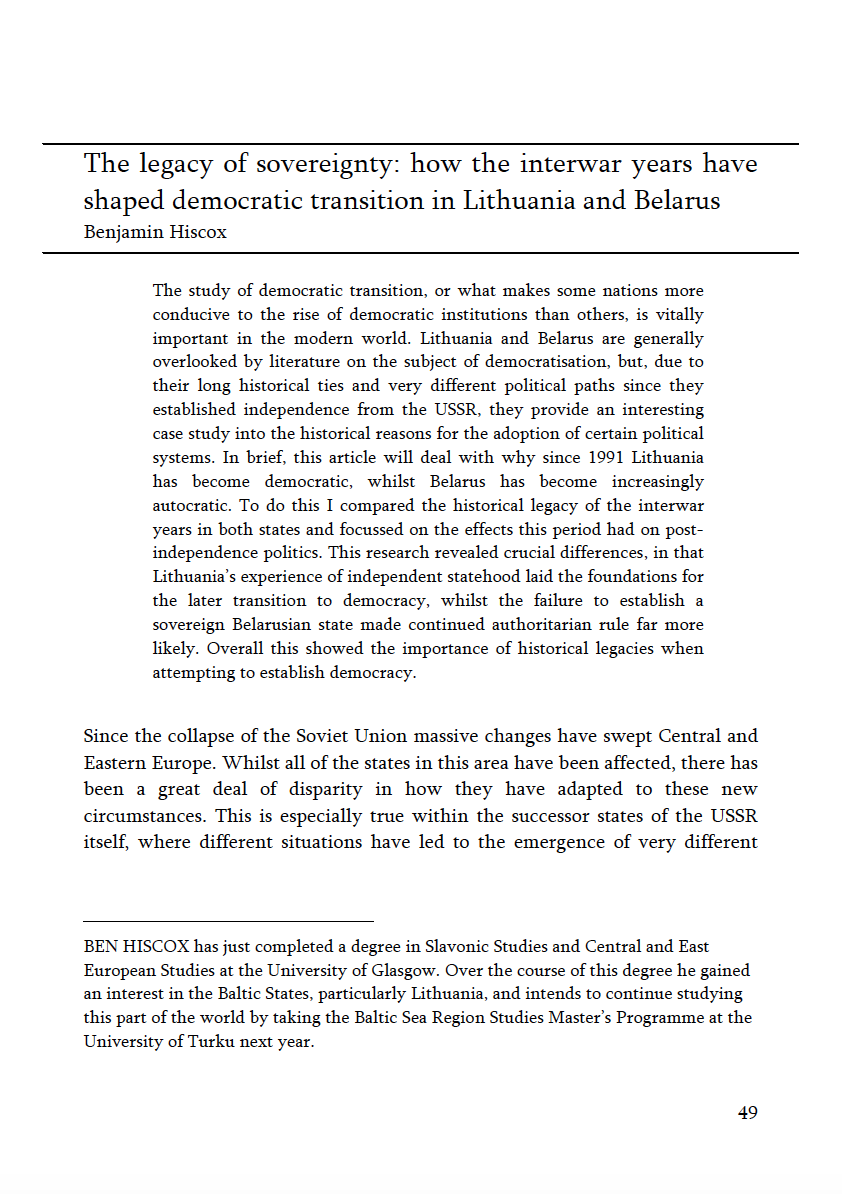The legacy of sovereignty
how the interwar years have shaped democratic transition in Lithuania and Belarus
DOI:
https://doi.org/10.36399/GroundingsUG.2.267Keywords:
Belarus, Lithuania, Independence, Democracy, Democratic Transition, Case Study, Autocracy, InterwarAbstract
The study of democratic transition, or what makes some nations more conducive to the rise of democratic institutions than others, is vitally important in the modern world. Lithuania and Belarus are generally overlooked by literature on the subject of democratisation, but, due to their long historical ties and very different political paths since they established independence from the USSR, they provide an interesting case study into the historical reasons for the adoption of certain political systems. In brief, this article will deal with why since 1991 Lithuania has become democratic, whilst Belarus has become increasingly autocratic. To do this I compared the historical legacy of the interwar years in both states and focussed on the effects this period had on post-independence politics. This research revealed crucial differences, in that Lithuania’s experience of independent statehood laid the foundations for the later transition to democracy, whilst the failure to establish a sovereign Belarusian state made continued authoritarian rule far more likely. Overall this showed the importance of historical legacies when attempting to establish democracy.
References
Ashbourne, Alexandra. Lithuania: The Rebirth of a Nation 1991-1994. Lanham, Maryland: Lexington Books, 1999.
BBC News Online. “Lithuania Seeks Minister’s Arrest, 30 August 2006.” British Broadcasting Corporation. http://news.bbc.co.uk/2/hi/europe/5299786.stm (accessed 10 June 2008).
Davies, Norman. God’s Playground: A History of Poland in Two Volumes. Volume II: 1795 to the Present. Oxford: Oxford University Press, 2005.
Eidinatis, Alfonsas, Vytautas Žalys, and Alfred Erich Senn. Lithuania in European Politics: The Years of the First Republic, 1918-1940, Houndmills, Hampshire: Macmillan Press, 1997.
European Commission. “Agenda 2000 – Commission Opinion on Lithuania’s Application for Membership of the European Union.” European Commission. http://ec.europa.eu/enlargement/archives/pdf/dwn/opinions/lithuania/li-op_en.pdf (accessed 10 June 2008).
Freedom House. “Nations in Transit 2005 – Lithuania.” Freedom House Europe. http://www.freedomhouse.hu/pdfdocs/lithuania2005.pdf (accessed 10 June 2008).
Freedom House. “Nations in Transit 2006 – Belarus.” Freedom House Europe. http://www.freedomhouse.hu/pdfdocs/belarus2006.pdf (accessed 10 June 2008).
Freedom House. “Nations in Transit 2006 – Lithuania.” Freedom House Europe. http://www.freedomhouse.hu/pdfdocs/lithuania2006.pdf (accessed 10 June 2008).
Goehring, Jeannette, and Amanda Schnetzer, editors. Nations in Transit 2005: Democratization in East Central Europe and Eurasia. Lanham, Maryland: Rowman & Littlefield, 2005.
Huntington, Samuel P. The Third Wave: Democratization in the Late Twentieth Century. Norman: University of Oklahoma Press, 1993.
Jungertam-Mulders, Susanne, editor. Post-Communist EU Member States: Parties and Party Systems. Aldershot, Hampshire: Ashgate, 2006.
Kiaupa, Zigmantas. The History of Lithuania. Vilnius: Baltos Lankos, 2004.
Lubachko, Ivan S. Belorussia Under Soviet Rule 1917-1957. Lexington: The University Press of Kentucky, 1972.
Marples, David. “Belarus: The Last European Dictatorship?” In The EU & Belarus: Between Moscow & Brussels, edited by Ann Lewis, 31-44. London: Federal Trust for Education and Research, 2002.
OSCE/ODIHR Election Observation Mission. “Final Report on the Parliamentary Elections in Lithuania, 20 October and 10 November 1996.” Office for Democratic Institutions and Human Rights. http://www.osce.org/odihr (accessed 10 June 2008).
OSCE/ODIHR Election Observation Mission. “Republic of Belarus Presidential Elections,19 March 2006: OSCE/ODIHR Election Observation Mission Report.” Office for Democratic Institutions and Human Rights. http://www.osce.org/documents/odihr/2006/06/19393_en.pdf (accessed 10 June 2008).
Ramonaitė, Ainė “The Development of the Lithuanian Party System: From Stability to Perturbation.” In Post-Communist EU Member States: Party and Party Systems, edited by Susanne Jungertam-Mulders, 69-91. Aldershot, Hampshire: Ashgate, 2006.
Vakar, Nicholas Platonovich. Belorussia: The Making of a Nation. Cambridge, Massachusetts: Harvard University Press, 1956.

Downloads
Published
Issue
Section
License
Copyright (c) 2008 Benjamin Hiscox

This work is licensed under a Creative Commons Attribution 4.0 International License.
The CC BY 4.0 license is a Creative Commons license. This is a non-copyleft free license that is good for art and entertainment works, and educational works. It is compatible with all versions of the GNU GPL; however, like all CC licenses, it should not be used on software. People are free to: Share — copy and redistribute the material in any medium or format; Adapt — remix, transform, and build upon the material for any purpose, even commercially. The licensor cannot revoke these freedoms as long as you follow the license terms. But they must conform to the following terms: Attribution — You must give appropriate credit, provide a link to the license, and indicate if changes were made. You may do so in any reasonable manner, but not in any way that suggests the licensor endorses you or your use. No additional restrictions — You may not apply legal terms or technological measures that legally restrict others from doing anything the license permits.
Please check individual article PDF copies to see if any additional restrictions apply.







